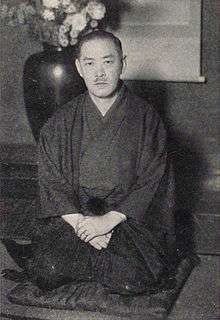Yoriyasu Arima
Count Yoriyasu Arima (有馬 頼寧, Arima Yoriyasu, December 17, 1884 – January 9, 1957) was a Japanese politician before and during World War II. His wife was the daughter of Prince Takeda Tsunehisa.
Count Yoriyasu Arima | |
|---|---|
有馬 頼寧 | |
 Yoriyasu Arima in 1940 | |
| House of Representatives of Japan | |
| In office 1924–1929 | |
| Japanese House of Peers | |
| In office 1929 – 22 May 1947 | |
| Minister of Agriculture | |
| In office 4 June 1937 – January 1939 | |
| Personal details | |
| Born | December 17, 1884 Tokyo, Japan |
| Died | January 9, 1957 (aged 72) |
| Political party | Rikken Seiyūkai |
| Spouse(s) | Princess Sadako NyoÅ |
| Alma mater | Tokyo Imperial University |
| Known for | Japan Farmer's Union Tokyo Senators (1936 franchise) Imperial Rule Assistance Association Nakayama Racecourse |
Biography
Arima was born in Tokyo as a son of the former daimyō of Kurume Domain (now part of Fukuoka Prefecture). He studied agricultural science at the Tokyo Imperial University, and later became a professor there.
He read Karl Marx and Max Stirner, and other radical philosophers, and became attracted to the agrarian movement and radical political ideas. Arima founded the Nihon Nomin Kumiai (Japan Farmer's Union) together with Kagawa Toyohiko. He was active in various social programmes, including the establishment and support of night school, women's education, farmer's rights, and the rights of the burakumin, and was chairman of a cultural association aimed at improving education and cultural awareness in rural areas.
Arima was elected to the House of Representatives in the Diet of Japan in 1924 under the Rikken Seiyūkai party. In 1929, after he succeeded his father to the title of hakushaku (count) under the kazoku peerage system, he was nominated to the House of Peers.
Arima was a close personal friend of Fumimaro Konoe, and when Konoe became Prime Minister of Japan in 1937, Arima was requested to serve as his Minister of Agriculture. He also participated in Konoe's Showa Studies Society "Brain trust".
In 1936, Arima helped organize the Tokyo Senators baseball team, and built a baseball stadium located where the present Korakuen Stadium in Tokyo is now located. Despite pressure from the Japanese military to ban the "western sport" Arima helped sustain it during the war years, and later helped to revive professional baseball in Japan in the postwar period.
In 1940, Arima became head of the Taisei Yokusankai organization, but resigned after five months due to opposition from the militarist faction in the government.
In the post-war period, he was active in promoting horse racing and was one of the founders of the Nakayama Racecourse. He died in 1957 of acute pneumonia. The Arima Kinen horserace was named in his honor.
References
Books
- Bix, Herbert P. (2001). Hirohito and the Making of Modern Japan. Harper Perennial. ISBN 0-06-093130-2.
- Sims, Richard (2001). Japanese Political History Since the Meiji Renovation 1868–2000. Palgrave Macmillan. ISBN 0-312-23915-7.